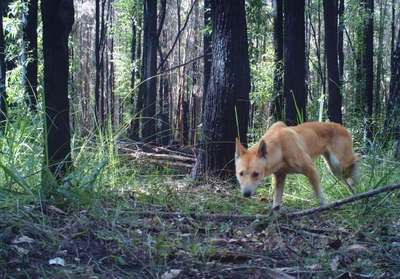A balanced ecosystem needs apex predators
Poisoning dingoes, an apex predator in the Australian bush, leads to upsurges in numbers of kangaroos and foxes that in turn causes a decline of small mammals.

The study was conducted by researchers from the University of New South Wales (UNSW), the University of Western Sydney and the University of Sydney in forested national parks in NSW. The researchers found that loss of dingoes after baiting was associated with greater activity by foxes, which prey on small marsupials and native rodents, such as marsupial mice, bandicoots and native rodents.
The number of kangaroos and wallabies also increased when dingoes were poisoned. Grazing by these herbivores reduces the density of the understorey vegetation in which the small ground-dwelling mammals live.
"Dingoes should not be poisoned if we want to halt the loss of mammal biodiversity in Australia. We need to develop strategies to maintain the balance of nature by keeping dingoes in the bush, while minimising their impacts on livestock," said Dr Mike Letnic, an ARC Future Fellow in the Centre for Ecosystem Science in the UNSW School of Biological, Earth and Environmental Sciences.
The researchers surveyed seven pairs of forested sites within conservation reserves managed by the NSW National Parks and Wildlife Service.
Baiting of dingoes with 1080 poison had been carried out at one location in each pair, but not the other. Apart from the resulting difference in the number of dingoes present, the paired locations had similar eucalypt coverage, geology and landforms, and were less than 50 kilometres apart.
"This provided an extraordinary natural experiment to compare the impact of the loss of dingoes on a forested ecosystem," said Dr Letnic.
It is the first study to show how removing large carnivores can result in simultaneous population outbreaks of herbivores and smaller predators. And that these population outbreaks, in turn, can have deleterious effects on smaller mammals.
The study's findings in the forested areas are consistent with the effects of dingo removal in desert areas of Australia.
"Actively maintaining dingo populations, or restoring them in areas where they have been exterminated, is controversial but could mitigate the impacts of foxes and herbivores," said Dr Letnic.
"Poisoning of dingoes is counter productive for biodiversity conservation, because it results in increases in fox activity and declines of small ground-dwelling native mammals."
The study is published in the journal Proceedings of the Royal Society B
Oxytocin analogue treats chronic abdominal pain
Researchers have developed a new class of oral painkillers to suppress chronic abdominal pain,...
'Low-risk' antibiotic linked to rise of dangerous superbug
A new study has challenged the long-held belief that rifaximin — commonly prescribed to...
Robotic hand helps cultivate baby corals for reef restoration
The soft robotic hand could revolutionise the delicate, labour-intensive process of cultivating...




